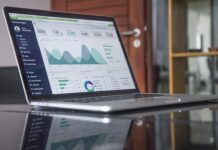This post may contain affiliate links. We may earn money or products from the highlighted keywords/banners or companies mentioned in this post.
Artificial Intelligence (AI) has become a game-changer in the business landscape, transforming the way companies operate and compete. With its ability to analyze vast amounts of data, make predictions, and automate processes, AI is revolutionizing various aspects of business, including marketing. Leveraging AI for competitive advantage has become crucial for businesses looking to stay ahead in today’s fast-paced and data-driven world.
Key Takeaways
- AI can provide a competitive advantage in various aspects of marketing.
- AI can revolutionize marketing strategies by providing insights and automating processes.
- AI can optimize social media presence by analyzing data and providing personalized content.
- AI can help identify the right keywords and target ideal customer segments for businesses.
- AI can improve ad quality and performance, as well as social media engagement and brand visibility.
Technology Marketing: How AI is Revolutionizing Marketing Strategies
AI is changing the way businesses approach marketing by providing advanced tools and platforms that can analyze customer behavior, predict trends, and personalize marketing campaigns. One example of AI-powered marketing tools is predictive analytics software, which uses machine learning algorithms to analyze historical data and make predictions about future customer behavior. This allows businesses to tailor their marketing strategies to specific customer segments and increase their chances of success.
Another example is chatbots, which use natural language processing and machine learning to interact with customers in real-time. Chatbots can answer customer queries, provide personalized recommendations, and even complete transactions, all without human intervention. This not only improves customer experience but also frees up human resources to focus on more strategic tasks.
The benefits of using AI in marketing strategies are numerous. AI-powered tools can help businesses gain valuable insights into customer behavior, enabling them to create more targeted and effective marketing campaigns. By automating repetitive tasks, AI also saves time and resources, allowing marketers to focus on more strategic activities. Additionally, AI can help businesses stay ahead of the competition by identifying emerging trends and predicting future market demands.
Social Media Marketing: Using AI to Optimize Your Social Media Presence
Social media has become an essential part of any marketing strategy, and AI can play a significant role in optimizing a business’s social media presence. AI-powered social media tools and platforms can analyze vast amounts of social media data to identify trends, sentiment analysis, and customer preferences. This information can then be used to create more targeted and engaging social media content.
One example of an AI-powered social media tool is social listening software, which monitors social media platforms for mentions of a brand, product, or industry-related keywords. This allows businesses to track customer sentiment, identify potential issues or opportunities, and respond in real-time. AI can also help automate social media posting and scheduling, ensuring that businesses maintain a consistent presence on multiple platforms.
The benefits of using AI in social media marketing are significant. By leveraging AI-powered tools, businesses can gain a deeper understanding of their target audience and tailor their social media content accordingly. This leads to higher engagement rates, increased brand awareness, and ultimately, more conversions. Additionally, AI can help businesses save time and resources by automating repetitive tasks such as content curation and scheduling.
Keyword Research: How AI Can Help You Identify the Right Keywords for Your Business
Keyword research is a crucial aspect of any SEO strategy, and AI can assist businesses in identifying the right keywords for their business. AI-powered keyword research tools and platforms use machine learning algorithms to analyze search trends, competition levels, and user intent to suggest relevant keywords.
One example of an AI-powered keyword research tool is Google’s Keyword Planner. This tool uses AI algorithms to analyze search data and provide insights into keyword volume, competition, and potential traffic. It also suggests related keywords that businesses may not have considered.
The benefits of using AI in keyword research are significant. By leveraging AI-powered tools, businesses can identify high-value keywords that have the potential to drive targeted traffic to their website. This leads to improved search engine rankings, increased organic traffic, and ultimately, more conversions. Additionally, AI can help businesses save time and resources by automating the keyword research process.
Market Segmentation: Leveraging AI to Identify and Target Your Ideal Customer Segments
Market segmentation is a critical component of any marketing strategy, and AI can help businesses identify and target their ideal customer segments more effectively. AI-powered market segmentation tools and platforms use machine learning algorithms to analyze customer data and identify patterns and similarities among different customer groups.
One example of an AI-powered market segmentation tool is customer segmentation software. This software uses AI algorithms to analyze customer data such as demographics, purchase history, and online behavior to create distinct customer segments. This allows businesses to tailor their marketing messages and offers to each segment, increasing the chances of conversion.
The benefits of using AI in market segmentation are significant. By leveraging AI-powered tools, businesses can gain a deeper understanding of their target audience and create more personalized marketing campaigns. This leads to higher engagement rates, increased brand loyalty, and ultimately, more conversions. Additionally, AI can help businesses save time and resources by automating the market segmentation process.
Content Creation: How AI is Changing the Way We Create and Distribute Content

AI is transforming content creation and distribution by providing advanced tools and platforms that can generate, curate, and distribute content at scale. One example of an AI-powered content creation tool is natural language generation software. This software uses AI algorithms to analyze data and generate human-like written content, such as blog posts, articles, and product descriptions.
Another example is content curation software, which uses AI algorithms to analyze vast amounts of content from various sources and curate relevant and engaging content for a specific audience. This allows businesses to provide valuable content to their audience without having to create it from scratch.
The benefits of using AI in content creation and distribution are significant. By leveraging AI-powered tools, businesses can create high-quality content at scale, saving time and resources. Additionally, AI can help businesses personalize their content based on user preferences, leading to higher engagement rates and increased brand loyalty.
Paid Search Campaigns: Maximizing ROI with AI-Powered Advertising
AI can help businesses maximize their return on investment (ROI) with paid search campaigns by optimizing ad targeting, bidding strategies, and ad placements. AI-powered advertising tools and platforms use machine learning algorithms to analyze vast amounts of data and make real-time adjustments to ad campaigns.
One example of an AI-powered advertising tool is programmatic advertising software. This software uses AI algorithms to analyze user data, such as demographics, browsing behavior, and purchase history, to deliver highly targeted ads to the right audience at the right time. This leads to higher click-through rates, improved conversion rates, and ultimately, a higher RO
The benefits of using AI in paid search campaigns are significant. By leveraging AI-powered tools, businesses can optimize their ad targeting and bidding strategies, leading to higher ad relevance and lower costs per click. Additionally, AI can help businesses save time and resources by automating the ad optimization process.
Quality Score: How AI is Improving Ad Quality and Performance
AI is improving ad quality and performance by analyzing various factors that contribute to a quality score, such as ad relevance, landing page experience, and expected click-through rate. AI-powered quality score tools and platforms use machine learning algorithms to analyze historical data and make predictions about ad performance.
One example of an AI-powered quality score tool is Google’s Smart Bidding. This tool uses AI algorithms to analyze historical data and make real-time adjustments to bidding strategies based on factors such as user intent, device type, and location. This leads to improved ad performance and a higher quality score.
The benefits of using AI in improving ad quality and performance are significant. By leveraging AI-powered tools, businesses can optimize their bidding strategies and improve their quality score, leading to higher ad rankings and lower costs per click. Additionally, AI can help businesses save time and resources by automating the bidding optimization process.
Social Ranking: Using AI to Improve Your Social Media Engagement and Reach
AI can help businesses improve their social media engagement and reach by analyzing various factors that contribute to social ranking, such as post engagement, follower growth, and content relevance. AI-powered social ranking tools and platforms use machine learning algorithms to analyze social media data and make predictions about post performance.
One example of an AI-powered social ranking tool is social media analytics software. This software uses AI algorithms to analyze social media data and provide insights into post engagement, follower growth, and content performance. This allows businesses to identify trends, optimize their content strategy, and improve their social ranking.
The benefits of using AI in social ranking are significant. By leveraging AI-powered tools, businesses can gain a deeper understanding of their social media performance and optimize their content strategy accordingly. This leads to higher engagement rates, increased brand awareness, and ultimately, more conversions. Additionally, AI can help businesses save time and resources by automating the social ranking analysis process.
Brand Visibility: Leveraging AI to Boost Your Brand’s Online Presence and Visibility to Target Audiences
AI can help businesses boost their brand’s online presence and visibility to target audiences by analyzing various factors that contribute to brand visibility, such as search engine rankings, online reviews, and social media mentions. AI-powered brand visibility tools and platforms use machine learning algorithms to analyze data from various sources and make predictions about brand performance.
One example of an AI-powered brand visibility tool is online reputation management software. This software uses AI algorithms to analyze online reviews, social media mentions, and other sources of customer feedback to provide insights into brand sentiment and reputation. This allows businesses to identify potential issues or opportunities and take appropriate actions to improve their brand visibility.
The benefits of using AI in brand visibility are significant. By leveraging AI-powered tools, businesses can gain a deeper understanding of their brand’s online presence and reputation and take proactive measures to improve it. This leads to increased brand awareness, improved customer trust, and ultimately, more conversions. Additionally, AI can help businesses save time and resources by automating the brand visibility analysis process.
AI is transforming marketing strategies by providing advanced tools and platforms that can analyze data, predict trends, and automate processes. Leveraging AI for competitive advantage has become crucial for businesses looking to stay ahead in today’s fast-paced and data-driven world. By using AI-powered marketing tools and platforms, businesses can gain valuable insights into customer behavior, create more targeted and effective marketing campaigns, and ultimately, achieve higher ROI. It is essential for businesses to stay up-to-date with the latest AI-powered marketing tools and platforms to remain competitive in the ever-evolving business landscape.
If you’re interested in leveraging artificial intelligence for competitive advantage, you might also want to check out this article on “Are Robots the Future of Your Business?” It explores how businesses can harness the power of robotics and automation to streamline operations, improve efficiency, and gain a competitive edge. With real-life examples and expert insights, this article provides valuable information on how AI and robotics can transform various industries. Read more
FAQs
What is Artificial Intelligence?
Artificial Intelligence (AI) is a branch of computer science that deals with the creation of intelligent machines that can perform tasks that typically require human intelligence, such as visual perception, speech recognition, decision-making, and language translation.
How can AI be leveraged for competitive advantage?
AI can be leveraged for competitive advantage in various ways, such as automating repetitive tasks, improving customer experience, enhancing decision-making, optimizing operations, and enabling predictive maintenance.
What are some examples of AI-powered applications?
Some examples of AI-powered applications include chatbots, virtual assistants, recommendation engines, fraud detection systems, image recognition software, and predictive analytics tools.
What are the benefits of using AI for competitive advantage?
The benefits of using AI for competitive advantage include increased efficiency, improved accuracy, enhanced customer satisfaction, better decision-making, reduced costs, and increased revenue.
What are the challenges of implementing AI for competitive advantage?
The challenges of implementing AI for competitive advantage include data quality and availability, lack of skilled personnel, ethical concerns, regulatory compliance, and integration with existing systems.
What industries can benefit from leveraging AI for competitive advantage?
Almost every industry can benefit from leveraging AI for competitive advantage, including healthcare, finance, retail, manufacturing, transportation, and education.
















































